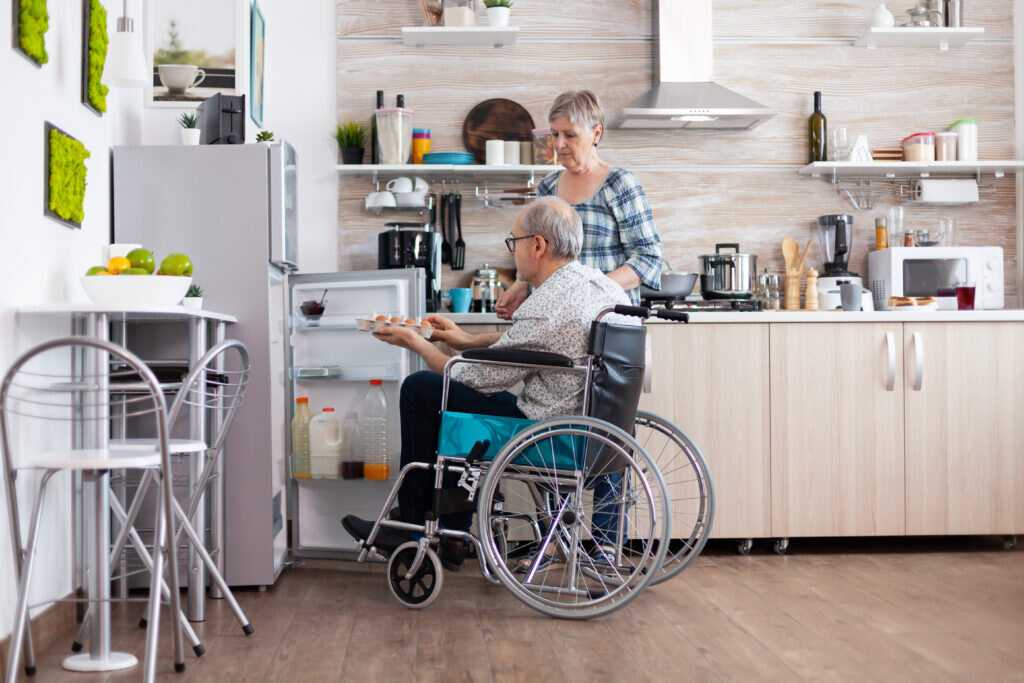Posted by Laura Sheath
Attendance Allowance | How to Claim to Pay for Home Care
Attendance Allowance is a government benefit for adults who have surpassed the UK state pension age and have a disability, medical condition or illness.
If you’re under the state pension age, don’t worry - you might be eligible for Personal Independence Payment (PIP) instead.

Don’t miss out
Have you ever checked if you can claim Attendance Allowance? If you’re eligible and haven’t made a claim, you could be missing out on £5,291 a year for the higher rate or £3,541.20 a year for the lower rate.
This Attendance Allowance guide includes information on how to apply with an example of how the weekly payments could be used to buy home care services near you.
We welcome calls to our advice line at 01892 335 330, where you can ask any questions about planning, finding or funding care.
Understanding Attendance Allowance and its benefits for home care services
How you spend your payments (if you’re eligible) is up to you but a lot of retirees use the additional money to contribute towards the cost of home care services.
The payments received from Attendance Allowance can give individuals greater flexibility and choice in arranging personalised support. The combination of extra money and the ability to find home care services through Autumna creates a practical and much-needed solution for older adults who need support.
Home care can support older adults with their day-to-day tasks like washing, grooming and cleaning. Some home care professionals will even assist with helping with pets, getting to and from appointments or cooking nutritious meals.
The Components of Attendance Allowance explained
Attendance Allowance consists of two components: the lower rate and the higher rate. The component an individual receives depends on their level of care needs:
Lower Rate: This component provides financial assistance for those who require frequent help or supervision during the day or night.
Higher Rate: The higher rate is for individuals who require assistance throughout both day and night or those who are terminally ill.
How much did Attendance Allowance rates increase for 2023/24?
In April 2023, the Attendance Allowance rates increased by 10.1%, which is in line with inflation. Other DWP disability and means-tested benefits, such as Personal Independence Payment (PIP), also experienced similar increases.
How much has the higher rate of Attendance Allowance gone up?
If you meet the eligibility criteria for the higher rate of Attendance Allowance in 2023/2024, you will be entitled to receive £101.75 per week, £440.92 per month, and £5,291 per year.
For the 2022/2023 period, the corresponding amounts were £92.40 per week, £400.40 per month, and £4,804.80 per year. This means that there is a rise of £9.35 per week, £40.52 per month, or £486.20 per year.
How much has the lower rate of Attendance Allowance gone up?
If you meet the eligibility criteria for the lower rate of Attendance Allowance for the 2023/2024 year, you will receive £68.10 per week, £295.10 per month, or £3,541.20 per year.
This is an increase from the 2022/2023 year, where the weekly rate was £61.85, the monthly rate was £268.02, and the yearly rate was £3,216.20. The current increase amounts to £6.25 per week, £27.08 per month, or £325 per year.
Proposed changes to Attendance Allowance rates in 2024/25
From April 2024, Attendance Allowance will be worth the following:
Lower rate: The lower rate will increase from £68.10 to £72.65 a week.
Higher rate: The higher rate will increase from £101.75 to £108.55 a week.
When is Attendance Allowance Paid?
Every four weeks, directly into your bank account.
You can use Attendance Allowance payments for any purpose, including to help you maintain your independence in your own home for a longer period.
How long is Attendance Allowance paid for?
Typically, this allowance is paid for a minimum of six months. However, if you still require extra care after this period, it may continue for a longer duration.
The length of time you will receive Attendance Allowance depends on your circumstances.
In general, you can receive it for as long as you continue to meet the eligibility criteria, which includes needing help with personal care due to a physical or mental disability.
However, if your condition improves or if you no longer need help with personal care, you may no longer be eligible to receive Attendance Allowance.
Qualifying for Attendance Allowance: Eligibility criteria you need to meet
To be eligible for Attendance Allowance, individuals must meet certain criteria:
Age: Applicants must be aged 65 or over at the time of application.
Disability: They need to have a physical or mental disability that significantly impacts their ability to carry out daily living activities or mobility. These disabilities can include conditions such as dementia, arthritis, or visual impairments.

Check your eligibility - even if you’re a self-funder
By leveraging Attendance Allowance and other financial options, you can create a holistic and sustainable plan for your long-term care needs in retirement.
Seek personalised advice from Autumna, the UK's largest later-life living and elderly care directory, to understand how Attendance Allowance or other benefits or allowances could help you enjoy a better quality of life during retirement.
Example of paying for home care with Attendance Allowance
Jean is 66 years old and has diabetes. This causes Jean difficulty in moving around and for the past year, she has also suffered from diabetic retinopathy. This visual impairment has changed the level of assistance that Jean needs and she considers home care services so that she can remain in her property and avoid moving to a care home.
Jean has checked the eligibility criteria and thinks she may be entitled to the higher rate of Attendance Allowance.
This would provide Jean with an additional monthly income of £440.92.
Jean makes a successful claim and asks Autumna to send her a list of home care services that are suitable for her needs and compares them with her granddaughter.

Leveraging Attendance Allowance: Using the benefit to pay for home care services
Jean is pleasantly surprised to learn that the average cost of home care in her town is just £22 an hour.
Jean contacts the free advice line at Autumna to calculate how many hours of home care she could afford as a result of receiving Attendance Allowance.
Ideally, Jean would like an hour of home care a day, to help her:
- Safely get out of bed
- Wash and dress
- Take her medication
- Prepare her breakfast
Her monthly cost of home care would therefore be £660. Her higher rate Attendance Allowance payments are £440.92 a month, which means that Jean will need to contribute £219.08 a month, either from her savings, pension or other benefits.
How much does home care cost in 2024?
What types of home care services are covered by Attendance Allowance?
The range of services provided by care workers varies between providers and not every home carer provides nursing or specialist care, however many do.
You can use the Autumna home care search portal to filter for your specific needs which may include:
- Alcohol/drug misuse
- Alzheimer's
- Cancer care
- Catheter care
- Challenging behaviour
- Dementia
- Hearing impairment
- Learning disability and neurodiversity (e.g. Autism)
- Mental health
- Overnight care
- Palliative care
- Parkinson's disease
- PEG Feeding
- Rehabilitation post-surgery
- Sight impairment
- Speech impairment
- Stoma care
- Stroke
- Wound dressing
Apply for Attendance Allowance: A step-by-step guide
1. Check Eligibility
Applicants must be at least 65 years old and have a physical or mental disability that requires help with personal care or supervision from another person.
2. Gather Necessary Documents
Collect all relevant documents, including:
- Personal identification
- A record of your prescriptions, including information about any side effects that affect you.
- Emails or letters from medical professionals such as your GP, NHS clinicians or pharmacists.
- Your medical records from the date your illness or disability began to affect you.
- A detailed diary of your daily routine, including notes on your pain and the difficulties you experience throughout the day.
- Any supporting evidence of how your condition affects your daily living or mobility.
3. Complete the Form
Fill in an Attendance Allowance claim form to apply. To get a form, you can either:
- Call the Attendance Allowance helpline on 0880 731 0122.
- Download a claim form through GOV.UK
Fill out the form accurately and provide specific information about your condition, how it affects you physically and mentally and any support you require. The greater the detail, the better.
5. Submit the Application
Make a copy of the completed form for your records, then send the original to the relevant address provided on the form.
6. Keep track of your application
Contact the Attendance Allowance helpline to inquire about its status or any additional steps you may need to take.
7. Be Prepared for a Decision
The Department for Work and Pensions (DWP) will review your application and make a decision based on the information provided. If successful, you will receive an award letter outlining the amount and duration of your allowance.
Tips to help improve your Attendance Allowance application
To increase your chances of being accepted, be specific and include information about any accidents, periods of pain or falls that you’ve had as a result of your illness or disability.
It can be helpful to also include details about the frequency with which you require support and whether your health conditions mean certain tasks are more difficult to do safely.
You might include information about needing support from a home carer so that you can remain in your home.
What happens if an Attendance Allowance claim is rejected?
In 2023, 58% of claims for Attendance Allowance were rejected.
If your claim is unsuccessful, you have the right to request a mandatory reconsideration or appeal.
Does someone you know already help you with your care?
If a family member, spouse or friend already helps to look after you, they might be classed as an unpaid carer and could be entitled to benefits or other financial help.
Tell them about the free Mini Carer's Assessment tool by Mobilise. As a carer, they could be eligible to receive financial, emotional or practical support too.
Here are just some of the things carers have received, following the advice from Mobilise to request a Carers’ Assessment:
- One-off direct payments to pay for support such as a paid carer
- Respite
- Gardener
- Gym membership
- Physio sessions
- Training in how to lift safely and use a hoist
- Massage and therapy vouchers
- Mobility equipment and house adaptations for cared-for
- Stairlift
Advice on finding and paying for home care
Finding suitable and reliable home care services is easy with Autumna.
Being the largest and most detailed care directory in the UK, we have access to a wide range of home care agencies that can accommodate a variety of needs.
Whether you need a professional to help at home with managing dementia, diabetes, arthritis or mobility issues, rely on Autumna to find you the best options.
Receive a Free Home Care Shortlist!
Let our expert team of advisors get your search off to a great start.
Tell us a little about your needs and we'll send you a bespoke shortlist of Home Care providers! Click the button below to begin, it takes just a few minutes.
Other articles to read
From the blog

Paying for Care
Can you get a free care home in Bristol if you have dementia?
April 27th, 2024
Lots of people think that a dementia diagnosis automatically entitles a person to free social care funded by the NHS or the local authority in Bristol. Unfortunately, that is not the case.

Paying for Care
Will the NHS pay for your care costs in Bristol?
April 16th, 2024
Read this guide before you pay for your care services or your parent’s care services in Bristol. Financial support for care fees could be available.

Paying for Care
Will WASPI women get compensation in 2024?
April 16th, 2024
With longer to wait for their pension, women born in the 1950's have been unable to afford care services as well as other essentials. WASPI news updates here.






